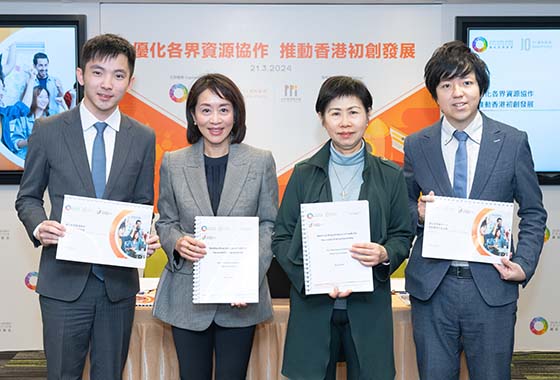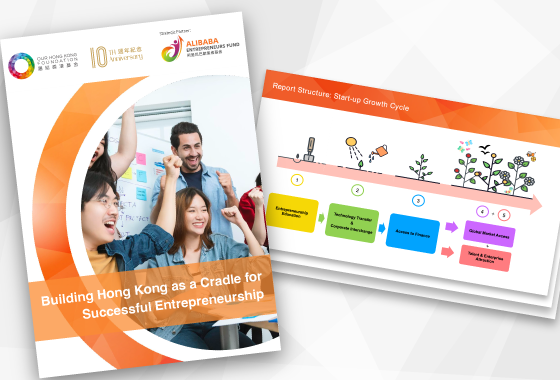More incentives needed to lift biotech industry
This article appeared originally in the China Daily on 27 April, 2022.
Authors: Kenny Shui, Head of Economic Development, and Arthur Tsang, Assistant Researcher at Our Hong Kong Foundation

With COVID-19 plaguing the world for years, many pharmaceutical multinationals have been expanding their research-and-development operations around the globe to tap both the current and the post-pandemic markets worldwide. In February this year, a multinational pharmaceutical giant said it planned to open a branch in Hong Kong — the first of its kind to conduct scientific research in our city.
This is, however, clearly a belated blessing. Previously, several biotechnology enterprises had intended to enter the Hong Kong market but received lukewarm responses from the special administrative region government, causing their plans to fall apart. Thanks to such narrow-mindedness, Hong Kong has missed out on a series of golden opportunities to attract front-runners to become anchor institutions, whereas cities worldwide have been proactively implementing preferential policies to encourage foreign investment.
The HK$10 billion ($1.3 billion) in funds earmarked in the government’s 2022-23 Budget for optimizing the industrial chain of life and health sciences is heartening, but policies to stimulate investment are yet to be seen. If Hong Kong remains complacent, development of the biotech industry will remain stagnant.
It’s reported that about seven years ago, the aforementioned corporation sought support to set up a vaccine factory in Hong Kong, mainly for epidemiology research. Lamentably, such an opportunity slipped away as Hong Kong failed to acknowledge the significance of corporate R&D. Undoubtedly, university R&D is important — the corporation itself is a spinoff with technology transferred based on the research findings of top universities in Cambridge, Massachusetts. However, technology transfer at Hong Kong’s local universities is not common in the meantime. Moreover, it’s an arduous and challenging journey for spinoffs to scale up, especially in Hong Kong, given various unfavorable factors, including a limited market size and an incomplete industrial chain. At the same time, not only will leading enterprises mobilize their abundant scientific research resources and strong industrialization competence to fuel the demand for university R&D, they can also introduce cutting-edge experience in scientific research to incubate countless startups.
WuXi AppTec — a leading contract research organization founded on the Chinese mainland — also planned to expand into Hong Kong some four years ago. With its plan nearing fruition, Hong Kong lost the golden chance again because of hiccups, reportedly, in infrastructure support and planning issues. The cumbersome procedures of getting approval from Hong Kong regulators has long been a subject of criticism, which is putting off the business sector. In fact, Hong Kong does not have a high-level department led by scientists to review the concerned systemic issues; nor has the city formulated development targets and blueprints, funding strategies and other policies for the biotech industry.
Lessons should be learned from the aforementioned failures for Hong Kong to make amends and encourage investment through flexible procedures. After Our Hong Kong Foundation published a research report on Hong Kong-Shenzhen biotechnology collaboration in July last year and urged the SAR government to proactively draw businesses, we’re glad to see the chief executive having met with a number of pharmaceutical multinationals last year, and has been exploring innovative policies to invite them to set up R&D bases in town. It is hoped the government won’t make the same regretful mistakes so as not to spoil such corporations’ expansion plans for Hong Kong.
That said, the corporation about to set foot in Hong Kong will also establish branches in Malaysia, Taiwan and Singapore, triggering evident competition. Besides throwing off its habitual nonchalance, the SAR government should implement more aggressive preferential policies to attract and retain more pharmaceutical powerhouses to conduct scientific research in Hong Kong, earnestly accommodating their needs, especially regarding funding and land resources for R&D and business operations.
It’s well known that other economies offer handsome funding rewards to attract overseas enterprises. On the contrary, Hong Kong has never swum with the tide, merely priding itself on the city’s simple and low tax regime, while its tax rates are admittedly not evidently lower than those of other regions. Coupled with a lack of preferential policies, such as tax-free programs and tax rebate policies, Hong Kong pales in comparison in this respect. We’re glad to see that with the central government’s support and the coordination of the Shenzhen municipal government, the chief executive is determined to develop the Lok Ma Chau Loop into a world-class I&T cluster. References can be drawn from Singapore to offer tax-free programs to enterprises setting up headquarters or R&D centers in the Loop, and from Australia to offer R&D expense reimbursement directly to enterprises to offset taxes. Both measures are more appealing than Hong Kong’s existing tax deductions.
Besides, for leading pharmaceutical companies to conduct self-initiated R&D, they need more space than general I&T enterprises to construct facilities, including laboratories and factories that meet the standards and requirements of major international drug administrations. As such, many economies allow enterprises to develop land according to their own plans. Hong Kong should allow enterprises with comprehensive R&D plans and those that could contribute significantly to Hong Kong’s economy to open branches at concessionary rental rates in I&T parks, such as the Lok Ma Chau Loop. Conceivably, approving mechanisms, land price discounts, tenancy and renewal mechanisms are worth discussing. It’s understood that the industrial estates (now called Innopark) are subject to criticism, with issues like hidebound industries and obsolete factories. This is also the reason why new policies for industrial estates were then put in place. Thus, regular assessments should be carried out during tenancy to ensure proper use of land.
The SAR government must surely pick the right industry and the right enterprise for Hong Kong to develop I&T. Attracting leading enterprises to be anchor institutions can create spillover effects in supporting the local ecosystem. For now, Hong Kong must get rid of its obstinate indifference and implement preferential policies proactively to ensure that the presence of biotechnology corporations can truly revitalize the local biotech industry.



